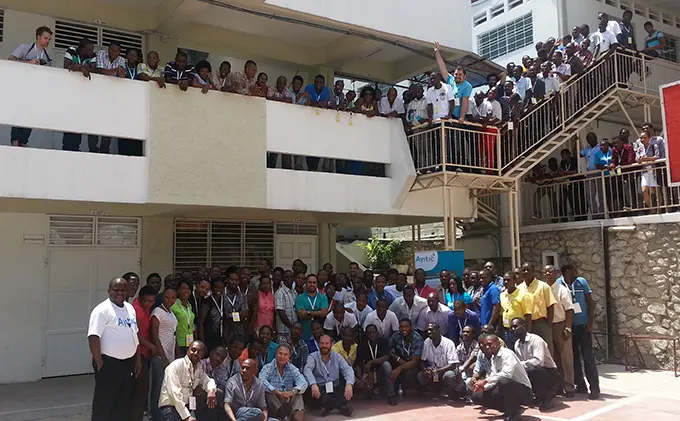Haiti on the move
01/09/2014

Ayitic “Internet for Development” is an initiative aimed at building digital capacity in Haiti based on a model that considers local development needs and seeks to create conditions such that the Internet can become an effective instrument of social inclusion and economic development for this Caribbean country.
Ayitic is a LACNIC initiative and is supported by the Internet Society, Google, the Organisation Internationale de la Francophonie, ICANN, and NSRC.
During its first two years of activities, Ayitic has already helped improve the technical skills of more than 250 Haitian information and communications technology students and professionals.
Lara Robledo, LACNIC’s Institutional Cooperation Coordinator, is excited with the progress achieved by the project – in most cases, knowledge has already been transferred to Haitian companies and other organizations.
Are the goals that were initially set out for Ayitic “Internet for Development” being met?
The local community’s response has been quite impressive, which leads us to believe that the project is being built on solid foundations. In terms of participation, last year we received 230 expressions of interest, while only 100 seats where available. This year we received approximately 325 expressions of interest.
What makes this project special is that participants get to decide the topics on which they would like to receive training. In other words, the project is modeled after the needs of Haitian students and professionals and is geared towards the country’s development. Training session topics are selected based on a set of questions especially designed by the project.
For example, for this year’s edition we added a session on IPv6 Development which was led by Julien Montavont, a professor at the University of Strasbourg, France. It is worth highlighting that this workshop was selected by potential participants themselves, as it was not part of last year’s program.
In this sense, we receive the most requests for the workshops on Network Management (led by NSRC) and Developing Wireless Networks (both basic and advanced), which clearly demonstrates the importance of designing projects in line with local communities’ needs. Haiti’s current reality means that developing wireless networks is essential, both in terms of their cost as well as well as due to their ability to provide a quick recovery in the face of a natural disaster.
Two aspects of this year’s events are worth noting. First, in one year, the number of female participants grew from 5 to 28. Many women, such as Haiti Women in Tech, are promoting female participation. Second, the Wireless Networks workshop was led by three local instructors, among them Petuel Placide, who had participated as a student in the previous edition of the event held in 2013. This is the model for knowledge transfer and strengthening the capacity of Haitian human resources – teachers – on which the project relies for its success.
In short, the project remains true to its original idea of not being simply a space for training professionals, as this alone would not guarantee development. The ultimate goal of this project is for Haitian ICT development to move one step forward every year.
What do the project’s beneficiaries think of the initiative?
Participants have completed learning processes which, in many cases, have required applying the acquired knowledge to real life situations and contributed to their personal career development as well as to that of the company or organization where they are currently working.
We must keep in mind that the goal of the project is not only that workshop participants acquire knowledge but also that they are able to transfer this knowledge and apply it first to their organizations and then to society as a whole.
According to the results of the impact survey that was sent in February/March 2014 to the 100 students who attended the 2013 workshops, eight out of ten attendees said that Ayitic made an important contribution to their global knowledge of ICTs. Almost 100% of the students rated workshop contents as either “useful” or “very useful.”
In addition, the vast majority of participants have applied the knowledge they acquired within their individual working environments. This fact strengthens the idea that the project is on the right track, as its positive impact is being clearly identified and is expanding knowledge and contributing to ICT development within Haiti.
Participants’ replies to the survey are quite interesting. Six months after the workshop, 26% of participants said that they had “improved their skills,” while 25% said that they had “acquired new skills.” Almost 15% mentioned that after Ayitic they had submitted project proposals at their workplaces, while a similar percentage claims to have been given new responsibilities by their employers.
Another response we are excited about is that four out of ten Ayitic participants aspire to a better job in Haiti. This means they are not currently considering leaving the country but, instead, they are working on improving their current situation.
Which other regional actors should be involved in this initiative so that the Internet can become a tool for social inclusion and a driver of Haiti’s local economy?
The key is to achieve local sustainability. The development of ICTs in Haiti requires reaching out and involving key local community stakeholders. A project led by Haitians for Haitians requires the commitment of multiple local organizations (government, ICT agencies, private companies, universities, international cooperation agencies based in Haiti, and the International community).
Ayitic is a LACNIC initiative made possible thanks to the support of the Internet Society, Google, the Organisation Internationale de la Francophonie, ICANN, and NSRC. However, the participation of more regional organizations and universities is necessary, for example, for creating a broad base of instructors involving local universities. An example of this is the support we received from NSRC, which we hope to continue to expand while we encourage other research groups.
(Free access, no subscription required)